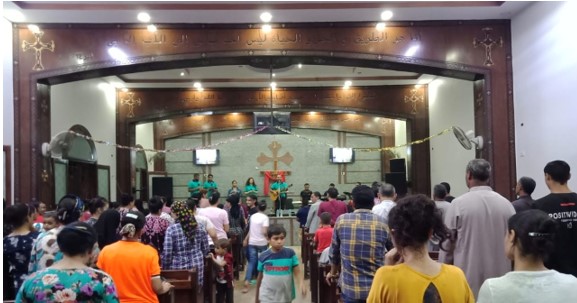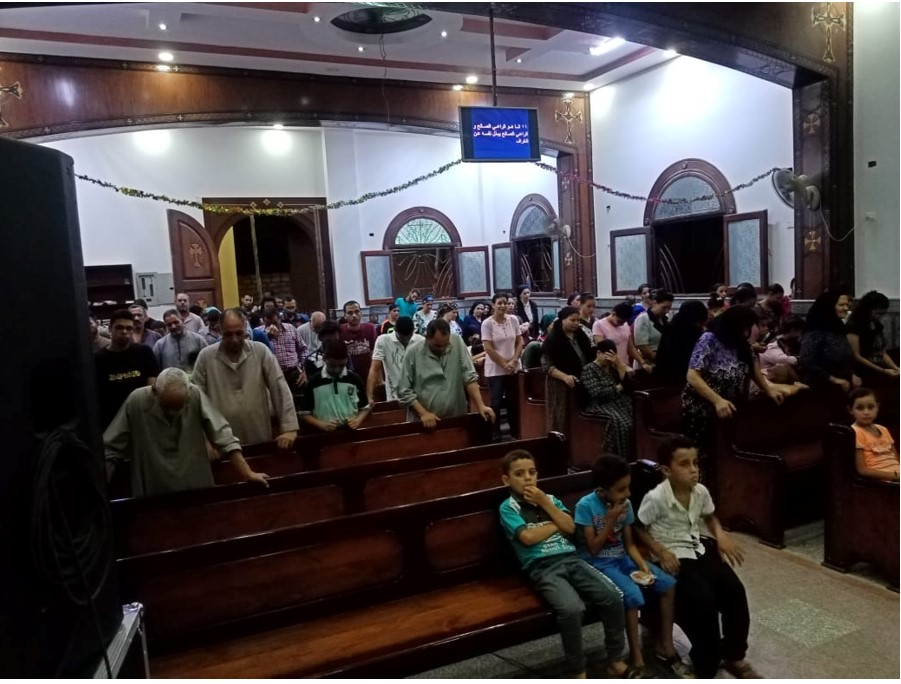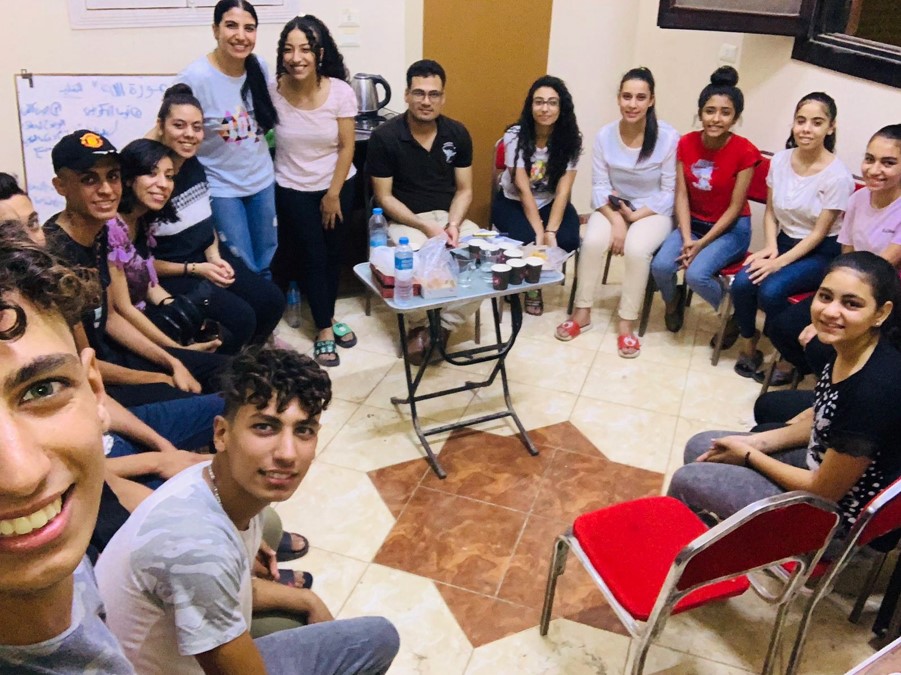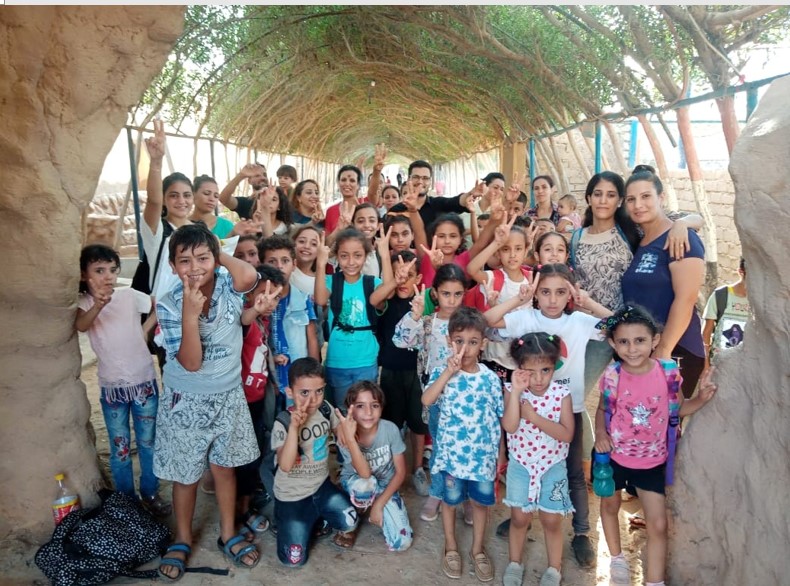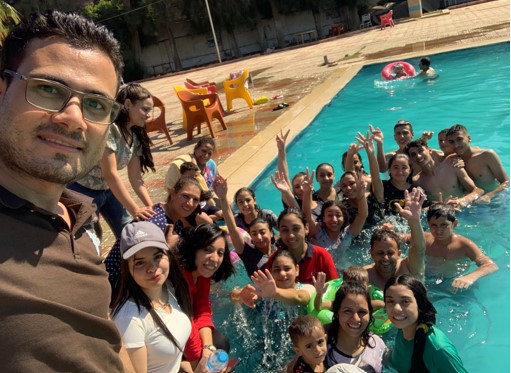A Letter from Noah Park and Esther Shin, serving in Egypt
Fall 2022
Write to Noah Park
Write to Esther Shin
Individuals: Give online to E132192 in honor of Noah Park and Esther Shin’s ministry
Congregations: Give to D500115 in honor of Noah Park and Esther Shin’s ministry
Churches are asked to send donations through your congregation’s normal receiving site (this is usually your presbytery).
Subscribe to our co-worker letters
Dear friends,
Greetings from Cairo!
In this letter, I would like to introduce the internship program at the Evangelical Theological Seminary in Cairo (ETSC). MDiv students on the ordination track attend the seminary for four years and participate in four summer internships. In the third year, they are sent to congregations without pastors. One of our students, Mina was sent to a Presbyterian church in a rural area about an hour away by bus from the city of El-Minya in Upper Egypt. He ministered as a solo pastor for three months.
One of the well-known facts in Egypt is the gap between the number of Christians and the number of congregations. What we call the Christian mission here means organizing congregations where Christians already are. Even with existing congregations, there are many cases where they remain unorganized without pastors. There are only a small number of MDiv students at ETSC who are on the ordination track and their ministries are incredibly impactful. They are the ones who can and will make a big difference to congregations and their neighborhoods. Mina’s three-month experience shows what it means to be a pastor in a congregation in the countryside.
The agricultural village where Mina went to has a population of about 5,000, of which about 1,000 are Christians. The larger area of Minya Governorate is considered one of the centers of Christianity in Egypt due to the earliest missionary activities by Presbyterian mission personnel. A well-established Coptic Orthodox church and an unorganized Presbyterian church served an estimated 40% of Christians. In other words, it was an area where more than half of the Christians were likely to attend an established church. But they didn’t, for a variety of reasons, and a church without a pastor was not attractive to them at all.
As the sanctuary picture shows, the congregation was not recently planted. Two previous pastors had resigned after six months and a year respectively, and this congregation remained without a pastor. Every Sunday, guest speakers came and preached. Since many of them were not ordained pastors and did not have formal theological education, their teaching caused various problems. In response, Mina first focused on two Sunday worship services by delivering biblical sermons as he was trained to do at ETSC. And he began to set up numerous groups for fellowship and training.Every evening people would gather at the church. Unmarried women met on Monday. A Bible study meeting took place on Tuesday. Married women gathered on Wednesday. The youth group took place on Thursday. A discipleship group assembled on Friday and a prayer service was held on Saturday. Each meeting was led by its leaders, but Mina attended all of them and led some as a pastor. Without a manse, he stayed in the church and worked every day without a day off for three months. Around lunchtime at 3 p.m., he visited the church members’ homes for three or four hours every day.
In this dedicated ministry as a student pastor, however, there was an unexpected resistance within the church. One day, Mina invited young adults to a barbecue party at the church in the evening. Then he got a call from a church member that the police were coming to the place. One of the church leaders reported to the police station that strange people were making a fuss at the church. His reason was ironically simple: the church is a place for worship and prayer only, not for barbecue at night. In his eyes, those young people at a meal were not “born-again.” This hard-to-explain incident may show how communication is difficult between generations in rural congregations.
Likewise, another church leader asked Mina not to preach the Epistle to the Romans. He believed that most of the church members were not truly repentant and the profound doctrines in Romans were not necessary for them. The church leader believed that most of the church members only needed to hear easy Gospel stories that could bring tears of repentance to their eyes. Mina also explained to me the influence of ultra-conservative theology along with Pentecostalism that has penetrated rural congregations in Egypt. In this atmosphere, church members judge one another instead of living together in love and forgiveness.
During Mina’s internship, Sunday service attendance doubled, not to mention other gatherings during the weekdays. With a pastor with a sound theology of the Reformed tradition, the congregation regained its vitality. Since Mina came back to ETSC for a new academic year, the congregation has rapidly returned to its previous situation. The daily meetings have almost disappeared, and Sunday services have been reduced to half the size. Mina is now praying that he should go back to the congregation for another internship and become an ordained pastor after graduation.
Last summer, we were able to stay in the U.S. visiting congregations in 10 different states. Each congregation welcomed us warmly and showed an interest in the 150-year-old partnership between the PC(USA) and the Synod of the Nile (Presbyterian Church of Egypt). Additionally, after a long interruption due to the pandemic, ETSC returned to normal in-person classes. Now MDiv students stay on campus taking classes and various trainings. It has been more than six years since we first arrived in Cairo here. We continue to feel that it is a special blessing to serve our students who will serve congregations in the Arabic speaking world.
Of course, we thank you for your continued prayers and support for our ministry.
Esther and Noah
Associates for Global Ecumenical Partnership in Egypt
Please read the following letter from Rev. Mienda Uriarte, acting director of World Mission:
Dear Partners in God’s Mission,
What an amazing journey we’re on together! Our call to be a Matthew 25 denomination has challenged us in so many ways to lean into new ways of reaching out. As we take on the responsibilities of dismantling systemic racism, eradicating the root causes of poverty and engaging in congregational vitality, we find that the Spirit of God is indeed moving throughout World Mission. Of course, the past two years have also been hard for so many as we’ve ventured through another year of the pandemic, been confronted with racism, wars and the heart wrenching toll of natural disasters. And yet, rather than succumb to the darkness, we are called to shine the light of Christ by doing justice, loving kindness and walking humbly with God.
We are so grateful that you are on this journey as well. Your commitment enables mission co-workers around the world to accompany partners and share in so many expressions of the transformative work being done in Christ’s name. Thank you for your partnership, prayers and contributions to their ministries.
We hope you will continue to support World Mission in all the ways you are able:
Give – Consider making a year-end financial contribution for the sending and support of our mission personnel (E132192). This unified fund supports the work of all our mission co-workers as they accompany global partners in their life-giving work. Gifts can also be made “in honor of” a specific mission co-worker – just include their name on the memo line.
Pray – Include PC(USA) mission personnel and global partners in your daily prayers. If you would like to order prayer cards as a visual reminder of those for whom you are praying, please contact Cindy Rubin (cynthia.rubin@pcusa.org; 800-728-7228, ext. 5065).
Act – Invite a mission co-worker to visit your congregation either virtually or in person. Contact mission.live@pcusa.org to make a request or email the mission co-worker directly. Email addresses are listed on Mission Connections profile pages. Visit pcusa.org/missionconnections to search by last name.
Thank you for your consideration! We appreciate your faithfulness to God’s mission through the Presbyterian Church (U.S.A.).
Prayerfully,

Rev. Mienda Uriarte, Acting Director
World Mission
Presbyterian Mission Agency
Presbyterian Church (U.S.A.)
To give, please visit https://bit.ly/22MC-YE.
For it is the God who said, ‘Let light shine out of darkness,’ who has shone in our hearts to give the light of the knowledge of the glory of God in the face of Jesus Christ. 2 Corinthians 4:6
![]() You may freely reuse and distribute this article in its entirety for non-commercial purposes in any medium. Please include author attribution, photography credits, and a link to the original article. This work is licensed under a Creative Commons Attribution-NonCommercial-NoDeratives 4.0 International License.
You may freely reuse and distribute this article in its entirety for non-commercial purposes in any medium. Please include author attribution, photography credits, and a link to the original article. This work is licensed under a Creative Commons Attribution-NonCommercial-NoDeratives 4.0 International License.
